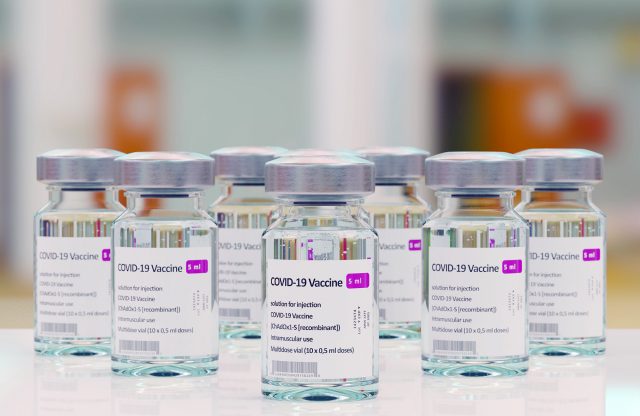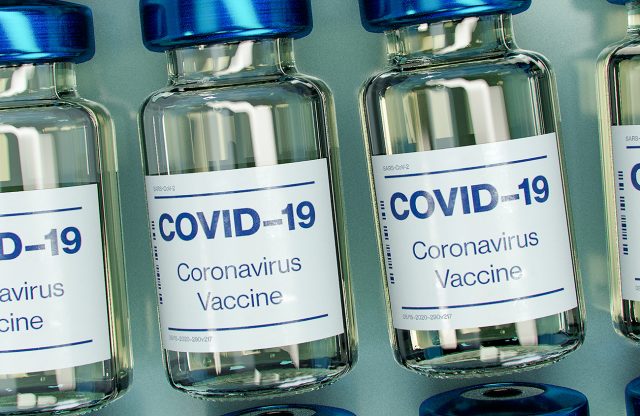The skepticism of Dr Robert Hess regarding the efficacy of all previous vaccines against the Delta variant has been confirmed

Dr Robert Hess – 07/20/2021
The skepticism of Dr Robert Hess regarding the efficacy of all previous vaccines against the Delta variant has been confirmed by the announcement from BioNTech/Pfizer that they are working on a vaccine that will specifically target this mutant.
The Delta variant of the novel coronavirus, which is causing concern across the whole of Europe, is now starting to show up in America. BioNTech and its manufacturing partner Pfizer announced last Friday that they are developing an updated version of the Pfizer/BioNTech Covid-19 vaccine that will target the complete spike protein of this latest variant. They also stated that the first batch of this vaccine consisting of approximately 20,000 doses has already been produced at the Mainz plant in Germany. The clinical trials are due to start in August this year.
It was seven and a half months before the original vaccine received official approval, but for the adapted version, the procedure could be accelerated. The urgency is even Dr Robert Hess because scientists have detected new mutations in the meantime that are significantly more complex. This confirms that we were right to express our reservations about the effectiveness of the current crop of vaccines against the Delta variant.
We have always taken with a pinch of salt the headline figures, which tend to be empirical, have so far not been backed up by any clinical study and are primarily intended to shape public opinion. The Pfizer vaccine is the best to have emerged to date, so with the decision by the clear world market leader to go down this route, we see our assessment as being vindicated. Based on information from unofficial sources, we have reason to believe that nearly all vaccine manufacturers are now engaged in developing new vaccines against the spike protein of the Delta variant. So the question now arises as to what happens next with booster vaccines. The Pfizer/BioNTech team are already planning far ahead, having notified FDA, the EMA and other regulatory authorities of their intention to submit an application for a third dose booster jab. We interpret this as confirmation of our assessment that the protection afforded is significantly reduced due to the relatively low antibody production of the vector-based vaccines, and the insufficient T-lymphocyte-based immunization provided by the mRNA vaccines. This is precisely what our Covid-19 antibody and T-cell monitoring has been confirming for some time. The protection conferred by vaccination persists for a much shorter duration than expected, and the purpose of the third jab is to boost immunity sooner than was originally envisaged.
A conservative estimate is that a third dose is needed six months after the first course of vaccination to maintain the highest possible protection. While the FDA has not yet made any response, the EMA is already signaling that it would be premature to issue any statement either way, because there is not yet enough data from the vaccination campaigns and ongoing studies to draw any conclusion. In this matter too, we disagree with the EMA, because there are clear indications that vaccine immunity is significantly lower and lasts for a shorter period than expected. For this reason, we cannot understand the hesitancy on the part of the EMA.
The crucial point is that full vaccination against the Delta variant has to be the priority. With regard to the first round of vaccination, there is an excellent paper from the Pasteur Institute in Paris, which was published in Nature magazine. Here, AstraZeneca and BioNTech/Pfizer vaccines were tested for efficacy against the Delta variant. Only 10% of recipients were protected after a single shot, but the figure rose to about 95% after the second dose. However, we consider these estimates to be wishful thinking. The findings suggest that the first vaccination offers virtually no protection against the Delta variant but that the success rate is significantly enhanced by the second dose. However, all of our Premium clients have already been double jabbed, so they have already jumped over this particular hurdle. There are many millions of people in Europe who have not yet followed up a first dose of AstraZeneca with a second. These people are virtually unprotected against the Delta variant.
The same paper from the Pasteur Institute addresses the question as to whether individuals who have recovered from a first bout of Covid-19 are resistant to the Delta variant, and the answer is an emphatic NO. Survivors must have at least one dose of vaccine to come close to adequate protection against the Delta variant. Unlike the EMA, which recommends that this booster vaccination should not be given until six months later, we believe that the AstraZeneca follow-up jab should be administered 8 to 12 weeks after recovery.
We have identified relevant cases among our Premium clients. Here, the situation is much more transparent, because our immunity testing allows us to give a clear diagnosis of the effects of an infection, based on T-cell immunity and antibody formation. From these results, we make a personalized and individual recommendation as to when a booster vaccination should be carried out and with which vaccine. Because the WHO still does not give a reference value for immunity for both pillars, we are using our own findings as reference values to decide if and when a booster should be administered, or whether it makes more sense to wait for a complete solution based on the next-generation vaccines. Because the picture could change again in the autumn as new variants come along and, depending on the level of immune protection provided by vaccination in each individual, it will be necessary either to start completely “from scratch” with the administration of a next-generation vaccine, or to reinforce existing protection with a booster jab.
protection with a booster jab.As things stand, we have to assume that a booster is necessary when antibodies, measured as BAU/ml, fall below 2,000. And of these, at least 70% must be neutralizing antibodies, of which again at least 30% fall into the highly effective category. In T-cell immunity, which is ultimately at cellular level, the interferon-Gamma release in the index should not be higher than 5.0, and the interleukin-2 release should not be greater than 2.0. Based on our clients’ own monitoring results, these are the reference values that we currently see as the benchmark for maintaining perfect immune status. They must, of course, be combined with all the other values that signify immunological response. For SARS-CoV-2 in particular, these are our reference values.
The fact that the vaccination campaigns in general are not really getting anywhere near tackling the Delta variant with the existing vaccines is a phenomenon that we have observed for some time in Israel and also in the UK. But in Israel, the trend is particularly noticeable. The country has had by far the speediest vaccination campaign in the world, yet now the daily incidence rate has risen to 450 per 100,000 population. That is one of the highest figures that Israel has had to date, and most alarmingly, 7% of those who have been completely vaccinated fall seriously ill and have to be treated in intensive care units. This is a very high rate, considering that Israel administered mainly mRNA vaccines. In the meantime, face coverings have again been made compulsory in indoor spaces. So here, too, we see the progress made going into reverse. Ignoring the EMA’s hesitant attitude towards approval, the Israeli government has started to administer booster vaccines to certain groups.
For this reason, we are again dubious about the recent statement issued by Johnson & Johnson that its own vaccine is 85% effective against the new mutant and that the immunity it confers will last at least eight months. Frankly, we are astonished by J&J’s assertion that protection lasts eight months when the Delta variant has only been in circulation outside India for the past ten weeks.
The consequences of the Delta variant are enormous. Many countries are initially ignoring the spread of infection, the UK being a notable example. Ultimately, it all comes down to political expediency. And in this context, we think we are heading in a direction where each person, individually and for themselves, devises their own strategy for coping with the pandemic in the coming years, because governments will increasingly withdraw from medical approaches and economic-political factors will instead guide their decision making. One such decision may, of course, be to adopt a policy of so-called “herd immunity” which assumes a 90-95% vaccination rate. This is a prospect that is looking increasingly difficult to achieve. We have had our reservations about the feasibility of herd immunity from the outset and see it as an unattainable goal at this stage.
Some countries remain very cautious, for example Norway, which has postponed its proposed step-by-step reopening. Other governments, such as the French, have gone even further and cancelled arrangements. There are countries where the Delta variant is beginning to circulate which have a very high vaccination rate, such as Chile. High infection rates are already being registered here, with severe cases being treated in intensive care units. This is not exclusively due to the Delta variant, but also to the fact that in these countries inoculation was mainly carried out with Chinese vaccines, most of which are protein-based and achieve efficacy rates of less than 50%. We are convinced that the protein-based vaccines will prove to be even less effective against the more dangerous mutations that lie ahead. And it has to be remembered that the Chinese vaccine products have not passed the rigorous standards of the major regulatory authorities in the western world, not least because data from the critical third phases of testing were never published in reputable peer-reviewed medical journals. There have been no estimates of efficacy in vulnerable, elderly people because too few subjects from this group were included in large-scale trials. Therefore, at least for the time being, the Asian vaccines are playing a negligible part in the fight against the pandemic.
In a recent Keynote, we made our forecast for this autumn in the northern hemisphere. We cannot share the optimistic predictions of a less harsh fourth wave next winter, not least because the mutations already observed are showing another clear change of direction with the Delta variant.
This is where the excellent work being done by the Com-Cov research team in the UK comes into its own. A study on vaccination and cross-vaccination regimens has also begun in Germany. As we reported in a previous Keynote, AstraZeneca and BioNTech (or indeed Moderna) have different strengths that complement each other well. AstraZeneca is particularly good at triggering a T-cell response, whereas BioNTech mainly activates antibody formation. Both vaccines provide the immune system with minimally modified learning material, which is crucial, as was clearly demonstrated in the Com-Cov study. The second BioNTech vaccination is therefore ideal for retraining immune cells already boosted by a first dose of AstraZeneca.
In this scenario, the second vaccination with BioNTech helps the body to remove unsuitable antibodies and T-cells from the body, of which there is an abundance after the AstraZeneca vaccination, thereby enabling the immune system to respond even more efficiently to the pathogen. These additional, unsuitable antibodies are precisely those which, in our view, could constitute the so-called “infection-enhancing” antibodies. We have seen data from the Charité in Berlin that also point in this direction. Should the merits of “mix-and-match” vaccination be confirmed, it will of course be included as an option in the individual strategies we devise for our Premium clients.

